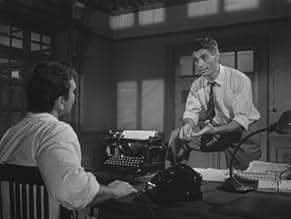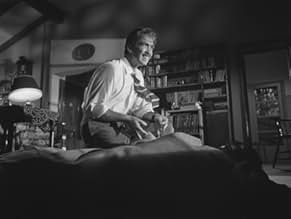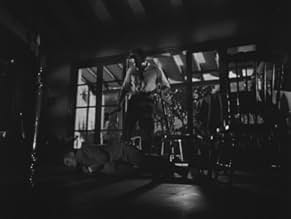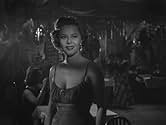IMDb RATING
7.6/10
988
YOUR RATING
A washed up reporter teams up with an immigrant from Hungary to start a fake journalism by correspondence school.A washed up reporter teams up with an immigrant from Hungary to start a fake journalism by correspondence school.A washed up reporter teams up with an immigrant from Hungary to start a fake journalism by correspondence school.
- Director
- Writers
- Stars
- Awards
- 3 wins total
Otto Webber
- Noriega
- (as Otto Weber)
George Hilton
- Hombre en redacción
- (as Jorge Hilton)
- Director
- Writers
- All cast & crew
- Production, box office & more at IMDbPro
Featured reviews
I am glad i found out about this movie. This is not a hidden gem but it's a good, maybe very good, crime/drama-film noir and every fan of this genre will probably like it. It doesn't even need to be a big fan of this genre, because all the elements of a good movie are here. Very good actors, a clever script, a very good director, nice cinematography and overall, an interesting-at least- movie.
I can't say i understood well the whole thing about this fraudulent operation of them. Maybe it was lost in translation. But the movie doesn't depend on this either way. Probably the biggest quality here is the script, this movie works better as a character study. The protagonist is a veey interesting character. And if you pay attention to his motives and his whole psyche, everything that he does is explainable. Not justified of course, but viewer can see the reasons.
It's getting gradually better and the last 20-30 minutes are the best part of this movie. I loved the fact that i couldn't see where it goes even though old movies are usually great but mostly predictable. The ending was very powerful if you catch the symbolisms. I didn't but i read some reviews and i understood this movie better.
I can't say i understood well the whole thing about this fraudulent operation of them. Maybe it was lost in translation. But the movie doesn't depend on this either way. Probably the biggest quality here is the script, this movie works better as a character study. The protagonist is a veey interesting character. And if you pay attention to his motives and his whole psyche, everything that he does is explainable. Not justified of course, but viewer can see the reasons.
It's getting gradually better and the last 20-30 minutes are the best part of this movie. I loved the fact that i couldn't see where it goes even though old movies are usually great but mostly predictable. The ending was very powerful if you catch the symbolisms. I didn't but i read some reviews and i understood this movie better.
Very dated movie done --part of it-- as expressionistic 1930s German cinema, part as realistic 1950s European neo realism, all mixed up with a very Argentinian way of interpreting the brief and blunt dialogs throughout the whole movie.
The story is quite interesting. It could have been superbly interesting if the script could have been fully developed going deeply into the main character psychology and motives for his behavior instead of the bumpy way shown here so abruptly from one scene to the next (unless I saw a faulty copy with missing scenes).
Our tortured main character motivations for what he does, as seen in this version, is totally incomprehensible, since he has no real proof to take such a drastic measure to solve the dilemma that tortures his feverish mind.
The photography may be the best asset in this film, done in black and white with a very impressive atmosphere, dark and oppressive almost all the time.
The soundtrack is also very good, following the black mood of the story very precisely and to the point.
But the whole feeling disclosed here, either about the city, its people or our protagonists is nowadays as removed from us as a Christopher Columbus ship could be as incongruous standing next to an atomic submarine.
The story is quite interesting. It could have been superbly interesting if the script could have been fully developed going deeply into the main character psychology and motives for his behavior instead of the bumpy way shown here so abruptly from one scene to the next (unless I saw a faulty copy with missing scenes).
Our tortured main character motivations for what he does, as seen in this version, is totally incomprehensible, since he has no real proof to take such a drastic measure to solve the dilemma that tortures his feverish mind.
The photography may be the best asset in this film, done in black and white with a very impressive atmosphere, dark and oppressive almost all the time.
The soundtrack is also very good, following the black mood of the story very precisely and to the point.
But the whole feeling disclosed here, either about the city, its people or our protagonists is nowadays as removed from us as a Christopher Columbus ship could be as incongruous standing next to an atomic submarine.
"And we decided to celebrate our end like the doomed in the movies do."
I loved the look and feel of this Argentinian noir, with its flashbacks, surreal dream sequences, and segues into the inner thoughts of its main character. Instead of a femme fatale we get a tragic figure (Aída Luz), and instead of everything coming apart because of a con game, we get drama out of misunderstanding and paranoia. These are basically good people, driven to dark places by economic desperation, with the post-war conditions in Europe looming as a distant backdrop. I wasn't completely sure about the ending, as the digging wouldn't have to be too deep and the guy should have known it (being vague here on purpose), but I loved how brutally grim it was. Overall, a very satisfying film.
I loved the look and feel of this Argentinian noir, with its flashbacks, surreal dream sequences, and segues into the inner thoughts of its main character. Instead of a femme fatale we get a tragic figure (Aída Luz), and instead of everything coming apart because of a con game, we get drama out of misunderstanding and paranoia. These are basically good people, driven to dark places by economic desperation, with the post-war conditions in Europe looming as a distant backdrop. I wasn't completely sure about the ending, as the digging wouldn't have to be too deep and the guy should have known it (being vague here on purpose), but I loved how brutally grim it was. Overall, a very satisfying film.
Based on this 1956 offering I'd say the Argentines have a thorough grasp of noir, no? This dark, curdled tale of not good vs evil but rather amiable crookedness vs evil is utterly fascinating. It's not a case of whom to root for but rather which of the two antagionists do we pity less? Tough call. On the one hand you have the loud, unctuous con artist and on the other there's the tortured, psychotic worm. My sympathies ultimately came down on the side of the later, but it was a close call and was made all the closer by the skilled performances of the two lead actors, Carlos Cores and Vassili Lambrinos, who perfectly embody these twin poles of ethical and moral corruption in mid 50s Argentina, as the tyrannical Peronist era was yielding to a slightly less tyrannical succession of military strongmen, an uneasy time in a country haunted by a repressive and fascistic past and facing an uncertain future. This state of mind is subtly brought out by director Fernando Ayala and his scenarist Sergio Leonardo in such scenes as the nightmares of Gaspar as he confronts his father's Nazi past and the wonderfully ironic ending where a hopeful new generation is planting flowers from bitter stems, unknowingly atop a corpse's grave. Throw in bleak, shadowy cinematography from one of Greg Toland's more apt pupils, Ricardo Younis, and a seductive jazz/tango score by Astor Piazzola and one can see why this film is a near masterpiece. Why near? Didn't like the character of Jarvis who is, in my opinion, unbelievably credulous around an obviously nutso Gaspar. Give it an A minus.
The Argentinian movie Los tallos amargos (1956) was directed by Fernando Ayala.
Carlos Cores portrays a journalist who forms an unlikely alliance with a Hungarian immigrant, played by Vassili Lambrinos. They open a fraudulent journalism correspondence school. All goes well until mistrust and jealousy intrude.
The acting in the movie is outstanding, and we are treated to a film score by the great Argentinian composer Astor Piazzolla.
We saw this movie at the wonderful Dryden Theatre at the George Eastman Museum in Rochester. Congratulations to the Dryden for screening this film in its original 35mm format. Los tallos amargos was considered lost until a 35mm negative was found and restored by the UCLA Film & Television Archive.
This movie might not be for everyone, but if you love film noir, this is the movie for you.
The acting in the movie is outstanding, and we are treated to a film score by the great Argentinian composer Astor Piazzolla.
We saw this movie at the wonderful Dryden Theatre at the George Eastman Museum in Rochester. Congratulations to the Dryden for screening this film in its original 35mm format. Los tallos amargos was considered lost until a 35mm negative was found and restored by the UCLA Film & Television Archive.
This movie might not be for everyone, but if you love film noir, this is the movie for you.
Did you know
- TriviaAs discussed on TCM's Noir Alley by host Eddie Muller in July 2021, a screening of the restored 35mm print of this film was held on behalf of the Film Noir Foundation at the Museum of Modern Art (MoMA) in New York City in February 2016, and shockingly in attendance was 90 year-old Vassili Lambrinos, who, after years of living in various parts of the globe, was living just a few blocks from MoMA. Lambrinos had never seen the film on the big screen nor with an audience before that screening, having seen the film only in an editing room before then.
- Quotes
Andreani: You make him infallible. You have an old passion; the need to obey.
Alfredo Gaspar: Passion to obey?
Andreani: To be a subordinate.
- ConnectionsReferenced in Preserving Memory: Fernando Martín Peña on Argentine Cinema (2024)
Details
- Release date
- Country of origin
- Language
- Also known as
- The Bitter Stems
- Filming locations
- Plaza de Mayo, Buenos Aires, Argentina(Gasper and Jarvis walk in the Plaza de Mayo and look at the Cabildo.)
- Production company
- See more company credits at IMDbPro
- Runtime
- 1h 30m(90 min)
- Color
- Sound mix
- Aspect ratio
- 1.37 : 1
Contribute to this page
Suggest an edit or add missing content






























